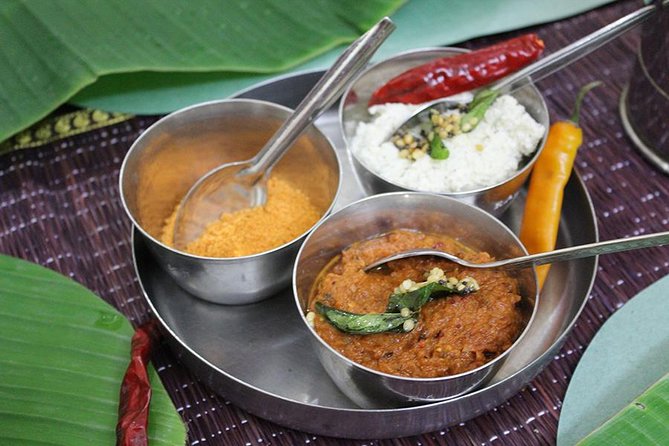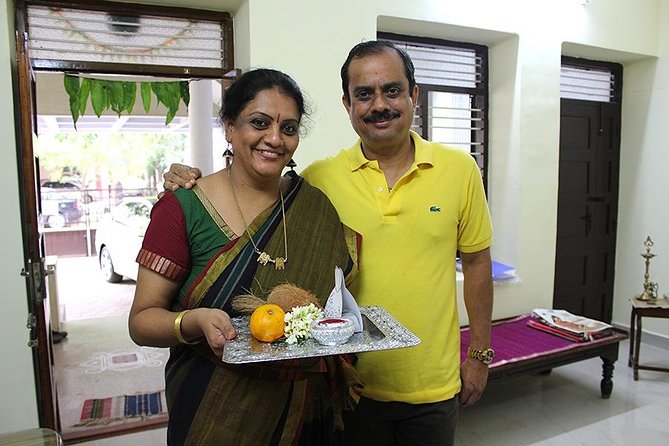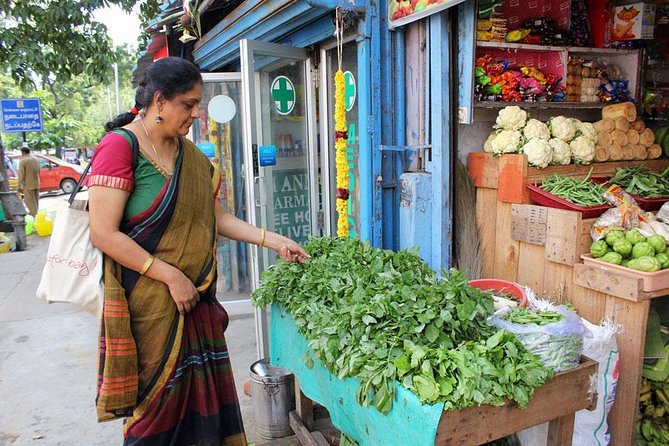Traditional Tamil Brahmin Vegetarian Cooking Lesson With a Local in Her Home
While some may worry about the complexity of traditional Tamil Brahmin vegetarian cooking, this immersive experience offers a hands-on opportunity to learn and savor the flavors of South India in an intimate setting.
As guests step into the local’s home, they are greeted with the aroma of spices and the promise of a culinary adventure unlike any other.
Stay tuned to discover how this cultural exchange unfolds, revealing not just the secrets of Tamil Brahmin cuisine but also the warmth and hospitality of the local host that make this cooking lesson truly unforgettable.
Key Points

- Learn traditional Tamil Brahmin cooking techniques from a local expert.
- Immerse in the cultural heritage through hands-on cooking experience.
- Enjoy a communal meal on banana leaves, symbolizing unity and tradition.
- Gain insights into South Indian culinary customs and rituals.
Overview of Traditional Tamil Brahmin Cooking

What makes Traditional Tamil Brahmin Cooking unique among Indian culinary traditions?
Tamil cuisine, deeply rooted in tradition and culture, showcases a distinct flavor profile that sets it apart. The culinary traditions of Tamil Brahmins focus on vegetarian dishes that aren’t only delicious but also prepared with meticulous attention to detail.
From the elaborate use of spices to the emphasis on fresh ingredients, every aspect of Tamil Brahmin cooking reflects a rich culinary heritage. The techniques passed down through generations ensure that each dish is a harmonious blend of flavors and textures.
The use of traditional utensils and cooking methods adds an authentic touch to the experience, making Traditional Tamil Brahmin Cooking a culinary journey like no other in the diverse landscape of Indian cuisine.
Ingredients and Cooking Techniques

Tamil Brahmin cooking, renowned for its meticulous attention to detail and rich culinary heritage, relies on a unique combination of ingredients and cooking techniques that elevate the flavors of traditional South Indian vegetarian dishes. Traditional ingredients such as lentils, rice, coconut, tamarind, and a variety of spices like mustard seeds, curry leaves, and fenugreek seeds form the backbone of these recipes.
The cooking methods involve intricate processes like tempering spices in hot oil, grinding fresh masalas, and slow-cooking to develop complex flavors. Plus, steaming, frying, and sautéing are common techniques used to prepare a wide array of dishes ranging from crispy dosas to creamy coconut curries.
Mastering these traditional ingredients and cooking methods is essential in creating the authentic taste of Tamil Brahmin cuisine.
Step-by-Step Cooking Demonstration

Engaging participants in a hands-on culinary experience, the step-by-step cooking demonstration showcases the intricate art of preparing traditional South Indian vegetarian dishes.
-
The host will guide guests through traditional cooking techniques passed down through generations, offering insights into the cultural significance of each step.
-
Participants will have the opportunity to actively participate in the cooking process, gaining practical experience in creating authentic Tamil Brahmin cuisine.
-
As the dishes come together, a rich exchange of cultural knowledge occurs, bridging the gap between local traditions and international visitors.
-
Through this immersive culinary experience, guests not only learn how to prepare a delicious meal but also engage in a meaningful cultural exchange that enhances their understanding of South Indian heritage.
Enjoying the Meal Together
As the aromatic South Indian vegetarian dishes near completion, participants eagerly anticipate the communal experience of savoring the meal together on traditional banana leaves. The act of sharing a meal holds deep cultural significance in Tamil Brahmin tradition, symbolizing unity and togetherness. As everyone gathers around the beautifully set banana leaf, the host encourages guests to share stories, fostering a sense of connection and cultural exchange. The vibrant colors and array of flavors on the leaf mirror the diversity and richness of Tamil Nadu’s culinary heritage. Conversations flow effortlessly as each bite becomes a gateway to understanding a new aspect of Indian life and tradition. The experience transcends mere food; it becomes a platform for building lasting memories and friendships.
| Benefits of Sharing a Meal Together | ||
|---|---|---|
| Fosters Unity and Togetherness | ||
| Encourages Cultural Exchange | ||
| Builds Lasting Memories and Friendships |
Cultural Insights and Local Experience
Enjoy a rich tapestry of cultural insights and local experiences during this traditional Tamil Brahmin vegetarian cooking lesson.
-
Local Traditions: Discover age-old culinary customs and rituals passed down through generations, adding depth to your understanding of Tamil Brahmin heritage.
-
Hands-On Cultural Immersion: Engage in the preparation of South Indian vegetarian dishes, gaining practical knowledge while connecting with the essence of Tamil cuisine.
-
Interactive Learning: Interact with your host, learning about the significance of ingredients, spices, and techniques unique to Tamil Brahmin cooking.
-
Authentic Experience: Enjoy a meal served on traditional banana leaves, a customary practice in Tamil Nadu that enhances the flavors and authenticity of the culinary journey.
Common questions
Can I Bring My Own Ingredients or Request Specific Dietary Accommodations for the Cooking Lesson?
While participants cannot bring ingredients, they can request dietary accommodations. The local host tailors the experience to individual needs. Enhance culinary skills by learning traditional Tamil Brahmin recipes. Enjoy variations suited to preferences and restrictions.
Are Children Allowed to Participate in the Cooking Lesson, and Is There a Minimum Age Requirement?
Children are allowed to participate in the cooking lesson with parental supervision. There may be age restrictions, so it’s advisable to check the details beforehand. Ensure the kids’ safety and enjoyment throughout the experience.
Is There a Dress Code or Any Specific Attire Recommendations for the Cooking Lesson?
Attire recommendations for the cooking lesson include comfortable clothing and possibly wearing something that can be easily cleaned, as it involves hands-on cooking. Cultural practices may suggest modest attire out of respect.
Can I Take Home Any Leftovers From the Meal Prepared During the Cooking Lesson?
Guests can take leftovers from the meal; however, it’s subject to dietary restrictions. The host will provide guidance on what can be safely taken. Enjoy the delicious dishes and cherish the flavors even after the cooking lesson ends.
Are There Any Traditional Rituals or Customs Involved in the Cooking Lesson That I Should Be Aware of Beforehand?
In the cooking lesson, participants may encounter traditional practices like chanting prayers before cooking and using specific cooking techniques unique to Tamil Brahmin cuisine. Ingredient sourcing holds cultural significance, emphasizing fresh, local produce.
Last Words

Experience the true essence of South Indian cuisine with a traditional Tamil Brahmin Vegetarian Cooking Lesson in a local’s home.
From learning about ingredients and cooking techniques to enjoying a meal together, this culinary journey offers a unique opportunity to learn about the rich culinary heritage of the region.
Get ready to savor the flavors and culture of South India in a memorable and authentic way.